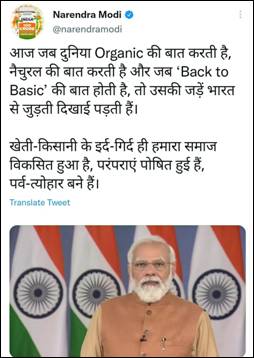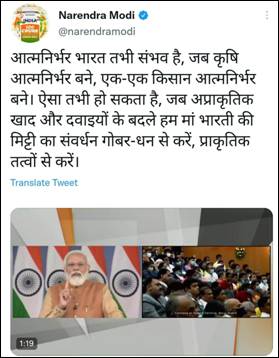Others
Zero Budget Natural Farming
प्रविष्टि तिथि:
17 DEC 2021 16:40 PM
Zero Budget Natural Farming
(Ministry of Agriculture & Farmers Welfare)
December 17, 2021
“नैचुरल फार्मिंग से जिन्हें सबसे अधिक फायदा होगा, वो हैं हमारे देश 80 प्रतिशत छोटे किसान। वो छोटे किसान, जिनके पास 2 हेक्टेयर से कम भूमि है। इनमें से अधिकांश किसानों का काफी खर्च, केमिकल फर्टिलाइजर पर होता है। अगर वो प्राकृतिक खेती की तरफ मुड़ेंगे तो उनकी स्थिति और बेहतर होगी।”-Prime Minister Narendra Modi
(December 16, 2021)
Introduction
Zero Budget Natural Farming (ZNBF) means raising crops without using any fertilizers and pesticides or any other external materials. The word Zero Budget refers to the zero cost of production of all crops. ZBNF guides the farmers towards sustainable farming practices thus helps in retaining soil fertility, to ensure a chemical free agriculture and ensure low cost of production (zero cost) and thereby enhancing the farmers income.
In short, ZBNF, is a farming method that believes in growing crops in tune with nature.
The concept was promoted by agriculturist & Padma Shri awardee SubhashPalekar, in the mid-1990s as an alternative to the Green Revolution’s methods driven by chemical fertilizers and pesticides and intensive irrigation.
Government has been promoting organic farming under the dedicated scheme of ParamparagatKrishiVikas Yojana (PKVY) which encourages all kinds of chemical-free farming systems including Zero Budget Natural Farming.
During his address to the farmers at the National Conclave on Natural Farming on December 16, 2021, Prime Minister Shri Narendra Modi remarked that “we need not only to re-learn this ancient knowledge of agriculture but also to sharpen it for modern times. In this direction, we have to do research afresh, mould ancient knowledge into the modern scientific frame”.The Prime Minister said that those who will benefit the most from natural farming, constitute about 80% of the farmers of the country. He urged every state, every state government, to come forward to make natural farming a Jan Andolan. In this AmritMahotsav, efforts should be made to associate at least one village of every panchayat with natural farming, he insisted.


Need
National Sample Survey Office (NSSO) data indicates more than 50 per cent of all farmers are in debt due to increased cost of farm inputs like fertilizers and chemical pesticides.
To realise the objective of doubling farmers’ income by 2022, the farm expenditure needs to be brought down and natural farming practices like ZBNF have to be encouraged to reduce the dependence of the farmers on external inputs like chemical fertilizers, pesticides etc.
Zero budget farming model brings down farm expenditure to a great extent and ends dependence on farm loans. It also reduces dependence on purchased inputs as it encourages use of own seeds and locally available natural fertilizers and farming is done in synchronization with nature.
Principles of Zero Budget Natural Farming
- No external inputs
- Soil to be covered with crops 365 days (Living Root)
- Minimal disturbance of Soil
- Biostimulantsas necessary catalysts
- Use indigenous seed
- Mixed cropping
- Integration of trees into the farm
- Water and moisture conservation
- Integrate animals in to farming
- Increase organic residues on the soil
- Pest-management through botanical extracts
- No synthetic fertilizers, pesticides, herbicides
Benefits
A study – “Life Cycle Assessment of ZBNF and Non-ZBNF in Andhra Pradesh” - reports the following benefits:
- ZBNF processes require 50–60 per cent less water and less electricity (than non-ZBNF) for all the selected crops.
- ZBNF reduces methane emissions significantly through multiple aeration. It also has the potential to avoid residue burning by practicing mulching.
- The cost of cultivation is lower in ZBNF.
Four main elements and models of ZNBF:
- Bijamrita:
The seeds are treated with formulations prepared using cow dung and cow urine from native cow species.
Benefits: The seeds sown in the field may be affected by fungus and other seed born/soil borne diseases. The seed treatment using “Bijamrita” protects the seeds from diseases.
- Jiwamrita/Jeevamrutha:
Jiwamrita is prepared using cow dung and cow urine. It is used as an input for the plants. It is a fermented microbial culture obtained from cow dung, urine, jaggery, pulse flour and uncontaminated soil. This fermented microbial culture when applied to soil, adds nutrients to the soil besides acting as a catalytic agent to promote the activity of microorganisms and earthworms in the soil.
Benefits: This culture stimulates microbial activity in the soil and enhances nutrient availability for the plants, protects the crops against soil pathogens and increases carbon content of the soil.
- Acchadana/Mulching:
Mulching is the process of covering the top soil with crop wastes/organic waste or with cover crops.
Benefits: Mulching materials decomposes and produces humus which conserves top soil, increases water retention capacity of the soil, decreases evaporation loss, encourages soil fauna besides enriching soil nutrient status and controlling weed growth.
- Waaphasa/Moisture (Soil Aeration):
Good aeration is required in the soil for plant growth and development.
Benefits: Due to the application of Jiwamrita and mulching, the aeration of the soil increases, thus improves humus content, water availability, water holding capacity and soil structure which is most suitable for crop growth especially during drought periods.
For complete details please, click here
ZBNF- Cropping Model
The model is based on raising poly crops i.e. growing short-duration and long-duration crops(main crop) together so that the cost of raising the main crops will be recovered from the incomegenerated from the short-duration crops resulting in “zero” expenditure for the main crop.Hence the term - “Zero Budget Natural Farming” - is used for this farming model.
Pilot Studyon Zero Budget Natural Farming
Some of the states following ZBNF
- Karnataka has initiated implementation of ZBNF on pilot basis in an area of 2000 ha in each of the 10 Agro Climatic Zones of the State through the respective State Agriculture/ horticulture Universities as demonstrations/ scientific experimental trials in farmer’s fields and in the research stations of the concerned universities.
· Himachal Pradesh is implementing State-funded scheme ‘PrakritikKhetiKhushaKisan’ since May, 2018, the details of which are as:
- 2018-19: 2669 farmers; Area - 357 ha.
- 2019-20: 19936 farmers; Area - 1155 ha.
The findings of studies conducted by the state indicated that ZBNF practice showed an improvement in soil quality within a single cropping season and incidence of invasive leaf miner was significantly less in ZBNF system as compared to the organic farming and conventional farming.
- Kerala –Awareness programmes, trainings and workshops are being conducted to draw interest of farmers towards ZBNF.
- Andhra Pradesh - Andhra Pradesh launched ZBNF in September 2015 under the RashtriyaKrishiVikas Yojana. RythuSadhikaraSamstha (RySS), Govt. of Andhra Pradesh is conducting experiments to generate the scientific evidence of the ZBNF in collaboration with University of Reading, UK World Agro forestry Centre, Nairobi, FAO & resource NGOs/Civil Society Organizations like Centre for Sustainable Agriculture, Hyderabad.
Union Government is promoting and supportingorganic farming and Zero Budget Natural Farming under various schemes
- DARE/ICAR through its Plan Scheme ‘Network Project on Organic Farming (NPOF)’ is undertaking research in 20 centers covering 16 states to develop location-specific organic farming package of practices for crops and cropping systems. Organic farming package of practices for 51 crops/cropping systems have been developed to provide technical backstopping to the line departments’ schemes implemented in the country.
- PKVY, a sub-component of Soil Health Management (SHM) scheme under National Mission for Sustainable Agriculture(NMSA), promotes cluster-based organic farming withParticipatory Guarantee System (PGS) certification. Cluster formation, training, certification and marketing are supported under the scheme. Assistance of Rs. 50,000 per ha for three years is provided, out of which 62 per cent i.e., Rs. 31,000 is given as incentive to a farmer towards use of organic inputs.
- The Mission Organic Value Chain Developmentfor North Eastern Region (MOVCD-NER), promotes 3rd party certified organic farming of niche crops of north east region through Farmer Producer Organisations(FPOs) with focus on exports. Farmers are given assistance of Rs. 25000/ha for three years for organic inputs including organic manure and bio-fertilizers etc. Support for formation of FPOs, capacity building, post-harvest infrastructure up to Rs. 2 Croresis also provided under the scheme.
- 100 per cent assistance is provided to State Governments/ Government agencies through Capital Investment Subsidy Scheme(CISS) under Soil Health Management Scheme for setting up of mechanized fruit/ vegetable market place, waste/ agro-waste compost production unit to the extent of Rs.190.00 Lakh/unit (capacity of 3000 tonne/annum of finished compost). Similarly, for individuals/private agencies, assistance up to 33 per cent of cost, limited to Rs. 63 lakh/unit as capital investment is provided for the purpose.
- Under the Agriculture Infrastructure Fund(AIF) of Aatmanirbhar Bharat, financing facility is provided to State agencies, Primary Agricultural Credit Societies, Farmer Producer Organisations, entrepreneurs etc. for setting up of organic input production units, community farming assets and post-harvest infrastructure for value addition to organic produce.
- The farmers are encouraged to use organic inputs by providing financial assistance through number of other schemes. For example, under the National Mission on Oilseeds and Oil Palm(NMOOP) and National Food Security Mission (NFSM), financial assistance @ 50 per cent subsidy to the tune of Rs. 300/- per ha is provided for use of organic inputs.
WayForward
- NITI Aayog is one of the foremost promoters of ZBNF method.
- The Andhra Pradesh Government experience is also being monitored closely to judge the need for further public funding support for ZBNF.
- The Indian Council of Agricultural Research is also studying the ZBNF method practiced by basmati and wheat farmers in some parts of India, evaluating the impact on productivity, economics and soil health including soil organic carbon and soil fertility.
- If found to be successful, an institutional mechanism needs to be created to promote the technology across the farming community.
References:
Video References:
Tweets:
Other useful links:
Paper on Zero Budget Natural Farming: https://ncds.nic.in/sites/default/files/WorkingandOccasionalPapers/WP70NCDS.pdf
AG/HP/AKP/IS
(तथ्य सामग्री आईडी: 148598)
आगंतुक पटल : 21147
Provide suggestions / comments